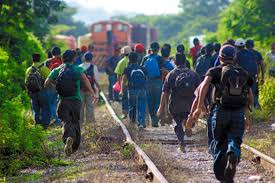“That’s it, dude! Done!” exclaimed Eliezer López as he jumped up and down, throwing his arms to the sky and drawing a sign of the cross across his chest. His joy was so contagious, his friends started to emerge from nearby tents to celebrate with him.
López, a 20-year-old Venezuelan migrant in Mexico City, had reason to rejoice: after several frustrating attempts, he was able to secure an appointment to seek asylum in the U.S.
He is one of thousands of migrants whose U.S.-bound journey has landed them in the Mexican capital, the southernmost point until recently from which migrants can register to request an appointment to seek asylum through the U.S. Customs and Border Protection’s mobile app known as CBP One.
Since June, when the Biden administration announced significant restrictions on migrants seeking asylum, the app became one of the only ways to request asylum at the Southwest border.
This U.S. asylum policy and its geographic limits are a driving force behind the emergence of migrant encampments throughout the Mexican capital where thousands of migrants wait weeks — even months — in limbo, living in crowded, makeshift camps with poor sanitation and grim living conditions.
Historically, Mexico City has not been a stop for northbound migrants. They try to cross the country quickly to reach the northern border. But the delays in securing an appointment, coupled with the danger that plagues cartel-controlled northern Mexico border cities and the increased crackdown by Mexican authorities on migrants have combined to turn Mexico City from a point of transit to a temporary destination for thousands.
Some migrant camps have been dismantled by immigration authorities or abandoned over time. Others, like the one where López has lived for the past few months, remain.
Like López, many migrants have opted to wait for their appointment in the somewhat safer capital, but Mexico City presents its own challenges.
Shelter capacity is limited, and unlike large U.S. cities like Chicago and New York, which rushed last winter to find housing for arriving migrants, in Mexico City, they are mainly left to their own devices.
Andrew Bahena, coordinator of the Coalition for Humane Immigrant Rights of Los Angeles, or CHIRLA, said that up until late 2023 many migrants were contained in southern Mexican cities like Tapachula, near the border with Guatemala. Many tried to disguise their location to defeat CBP One’s geographic limits, but when U.S. authorities took notice, more migrants began aiming for Mexico City to make their appointments from there, he said.
As a result, there has been an increase in the migrant population living in the Mexico City camps.
“We talk about this as border externalization and it’s something the United States and Mexico have been jointly implementing for years,” said Bahena. “The CBP One app is probably one of the best examples of that today.”
“These folks are asylum seekers, they’re not homeless people living in Mexico,” he added.
A maze of tents and tarps
When López first arrived in Mexico City at the end of April, he thought about renting a room only to realize it was not an option.
He earned 450 pesos ($23) a day working three times a week at a market. Rent was 3,000 pesos a week ($157) per person to share a room with strangers, an arrangement that has become commonplace in Mexican cities with migrant populations.
“The camp is like a refuge,” said López. Migrants can share space with people they know, avoid the curfews and strict rules of shelters and potentially stay longer if necessary.
The camps are a maze of tents and tarps. Some call their space “ranchito,” or small ranch, assembled from wood, cardboard, plastic sheets, blankets and whatever they can find to protect them from the chilly mountain air and intense summer rains that pound the city.
At another camp in La Merced neighborhood, hundreds of blue, yellow and red tents fill a plaza in front of a church. It’s one of the capital’s largest camps and just a 20-minute walk from the city center.
“This is a place where up to 2,000 migrants have been living in the last year,” said Bahena. ”About 40% are children.”
Migrants in La Merced have organized themselves, building an impromptu pump that moves water from the public system and distributes it on a fixed schedule, with every tent receiving four buckets of water every day.
“At the beginning there were a lot of problems, lots of trash and people in Mexico didn’t like that,” said Héctor Javier Magallanes, a Venezuelan migrant, who has been waiting nine months for a CBP One appointment. “We made sure to fix those problems little by little.”
As more migrants kept arriving at the camp, he set up a task force of 15 people to oversee security and infrastructure.
Despite efforts to keep the camp clean and organized, residents haven’t been able to avoid outbreaks of illnesses, exacerbated by drastic weather changes.
Keilin Mendoza, a 27-year-old Honduran migrant, said her kids constantly get colds, especially her 1-year-old daughter.
“She’s the one that worries me the most, because she takes the longest to recover,” she said. Mendoza has tried accessing the free medical attention from humanitarian organizations at the camp, but resources are limited.
Israel Resendiz, coordinator of Doctors Without Borders’ mobile team, said the uncertainty of life in the camps weighs heavily on migrants’ mental health. “It’s not the same when a person waiting for their appointment (…) can get a hotel, rent a room or have money for food. The majority of people don’t have these resources.”
The secretary of inclusion and social welfare and the secretary of the interior in Mexico City didn’t respond to a request for comment from The Associated Press about the camps. Press representatives of Clara Brugada, the incoming mayor of Mexico City, said the issue must first be discussed at the federal level.
Meanwhile, tensions between camp residents and neighbors have increased, sometimes leading to mass evictions of the camps.
In late April, neighbors from the trendy and central Juárez neighborhood blocked some of the city’s busiest streets, chanting, “The street is not a shelter!”
Eduardo Ramírez, one of the protest organizers, said it’s the government’s job to “help these poor people that come from their countries in search of something better and have the bad luck of traveling through Mexico.”
“They sleep on the streets because the government has abandoned them,” he said.
In a camp hosting about 200 families in the northern neighborhood of Vallejo, tensions — and fear — run rampant.
“One day they threw chlorinated water on a kid and hot water on another,” recalled 50-year-old Salvadoran Sonia Rodríguez, a resident of the camp.
Despite making her “ranchito” as dignified as possible — she has a grill for cooking, bunk beds and a television — her gaze turns somber when she remembers she’s been living for 10 months in an improvised camp that is not her home, without her things, far from her normal life. (https://apnews.com/article/mexico-migrants-asylum-cbp-app-camps-22b49fabf6e4d7d25d2873d0637544fe)



































